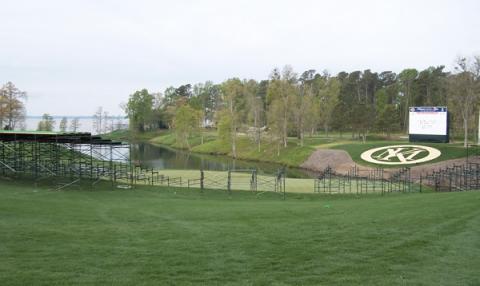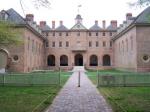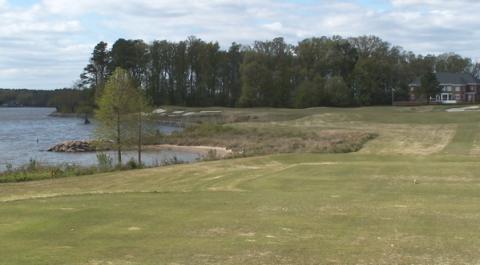
Fans will gather around the 18th hole at Kingsmill's River Course on Sunday to cheer home the victor at the Michelob Ultra LPGA event. Lorena Ochoa led after yesterday's first round, with a 7-under par 64.
...but real men won't be disappointed in the golf
In the course of a couple of years, the River Course at the Kingsmill Resort in Williamsburg, VA, went from a brawny and difficult layout to one that could be played and enjoyed by virtually ever type of golfer -- high and low handicapper, male and female. Pete Dye, whose difficult Stadium Course at Sawgrass will be featured this weekend at the PGA's Player's Championship, softened up the River Course in 2004. And this weekend also, the course that once hosted an annual tour stop on the PGA is playing host to the LPGA's Michelob Ultra Open.
Kingsmill's River Course an ego booster
I played the River Course a year ago, and it appeared to be especially friendly for average male and female golfers and modestly challenging from the men's tees for my 10 handicap. From just 6,300 yards, I can understand why the lady pros tore it up in the first round yesterday, Lorena Ochoa carding a tournament leading 64, 7 under par. Forty-five players finished under par on day one. As I wrote here one year ago, "the River course is not tough but it is thoroughly enjoyable." (You can read my full golf course review
by clicking here.) Although plenty of bunkers frame the large Dye

greens, thinly struck approach shots still have the chance to bound up and onto the large greens.
If I have any criticism of the River Course, the only one of the three at Kingsmill that I had the chance to play, it is that the cart paths come into play on some holes. Of course, Kingsmill is a resort, as well as a residential community, and certain compromises must be made in the name of speedy play. For their $30,000 "deposit" (most of it refundable upon departure), members do not want to endure five-hour rounds behind lollygagging guests who may be playing one of their few rounds of the year. Putting the cart paths closer to the field of play cut some time from a high-handicapper's round, at least in theory.
Latest price updates on Kingsmill homes
Kingsmill offers an entire range of real estate options, from town homes (villas) and "resort condominiums" to single-family residences, some quaint patio homes on small lots and some of the estate variety. Generally speaking, condos begin in the low to mid $300s, although they can reach the $500s for views of the wide and impressive James River, which gives the River Course its name. Town homes are the most reasonably priced segment of the market at Kingsmill, with prices beginning in the mid $200s (a current listing for an 1,854 square foot 3 BR, 2 ½ BA unit is $240,000). One of the choicest patio homes in the resort, which looks down on the 13th green of the River Course and features more than 2,500 square feet, is listed at $659,900. If you can compromise a little on the view and space, other single-family homes, most on larger lots, start in the mid $300s. Building lots begin in the $300s, prices that would seem to make the re-sale homes particularly good buys (e.g. that $659,000 home cited above would be priced at about $125 per square foot, after subtraction of land costs, comparably low for quality construction).
To encourage sales, Kingsmill Realty is offering a 20% discount on club membership if you purchase a home through one of its agents.
More excellent golf at Kingsmill and just outside the gates
The other two courses at Kingsmill, The Plantation (Arnold Palmer) and The Woods (Curtis Strange), provide alternative golfing experiences for club members and resort guests. Reviewers in the latest Zagat's guide to "America's Top Golf Courses" gave The Plantation and Woods courses
The Gold Course at Golden Horseshoe was rated best of Williamsburg's excellent roster of courses by Zagat reviewers.
each a rating of 23 out of 30, three points behind the ratings for the River Course. The Woods is especially refreshing in that its fairways and greens are beyond any home sites at Kingsmill, giving the layout the feel of a private, unaffiliated course.
The most highly rated course in Williamsburg, the Gold Course at the multi-layout Golden Horseshoe, is perennially rated one of the best public access courses in the state of Virginia (Zagat surveyors gave it a 28). The Green Course at Golden Horseshoe is also an area favorite. Further afield, fans of the late architect Mike Strantz will find some of his most imaginative work at Royal New Kent and Stonehouse, two courses that golfers seem to either love or hate for their blind shots and golf-on-steroids approach to design. Those unafraid of intimidating layouts should try Colonial Heritage, a difficult Arthur Hills design that, oddly, is smack in the middle of an age-restricted community. I was 60 years old when I played it, and felt 70 by the end.
Governors Land, the private club alternative in Williamsburg
Williamsburg can lay claim to being America's first tourist destination, given both its history and self-awareness of it. The town is set up to accommodate a large influx of those seeking to get in
Governors Land is just six miles from the center of Williamsburg, and yet the gated community feels much farther away than that.
touch with Colonial America and the nation's roots. Golf course and resort developers were conscious of this and have always opened their courses to public and resort traffic. The one island of private golf in the area is Governors Land which, like Kingsmill, is bounded by the wide expanse of the James River. At just six miles from the center of town, Governors Land is near, and yet feels so far, from the action.
The Two Rivers course at Governors Land, designed by Tom Fazio, is not unlike the River Course at Kingsmill in that it won't overtax the modestly skilled golfer but will certainly provide a pleasant four hours. A few of its finishing holes almost bump up against the river but are buffered by customary large Fazio bunkers; accept for a touch of the river close by the side of the 18th green, the only hazard the water provides is as a distraction from the swing.
Single-family homes, all that are available at Governors Land, start around $500,000. Homes with views of the river and golf course exceed $1 million. For those few hedge fund managers who exited the market at just the right time, a 22,000 square foot estate home on 10 riverfront acres is currently listed for $8.9 million.
Living in Williamsburg
If you like being on permanent vacation and in touch with history, and don't mind sharing some of your space with tourists or wearing a sweater in winter -- okay, a jacket as well -- Williamsburg is worth considering as a retirement or vacation spot. With many excellent and accessible daily fee golf courses in the area, you will not feel compelled to join any of them to have an active golfing life. Williamsburg is a charming town, with a well-preserved downtown area and small university, William & Mary, at its core (a nice program of courses for post-grads is offered). I was especially impressed with the road system in and around town; as if overly conscious years ago about the possibilities of tourist infestations, the roads are more than ample to handle the significant increase in new homes over recent decades, as well as the tour buses.
The Town Center just outside the city not only provides plenty of shopping and dining opportunities, but integrates residences and offices. Golfers inclined to work and/or shop where they live won't burn more than a gallon of gas for access to any of the excellent golf courses just a few miles away.
If Williamsburg sounds like your kind of place, let me know and I will provide you with much more in the way of research and opinion -- at no cost or obligation to you.
 The James River comes into play at Tom Fazio's Two Rivers course at Governors Land only on the 18th hole.
The James River comes into play at Tom Fazio's Two Rivers course at Governors Land only on the 18th hole.


























